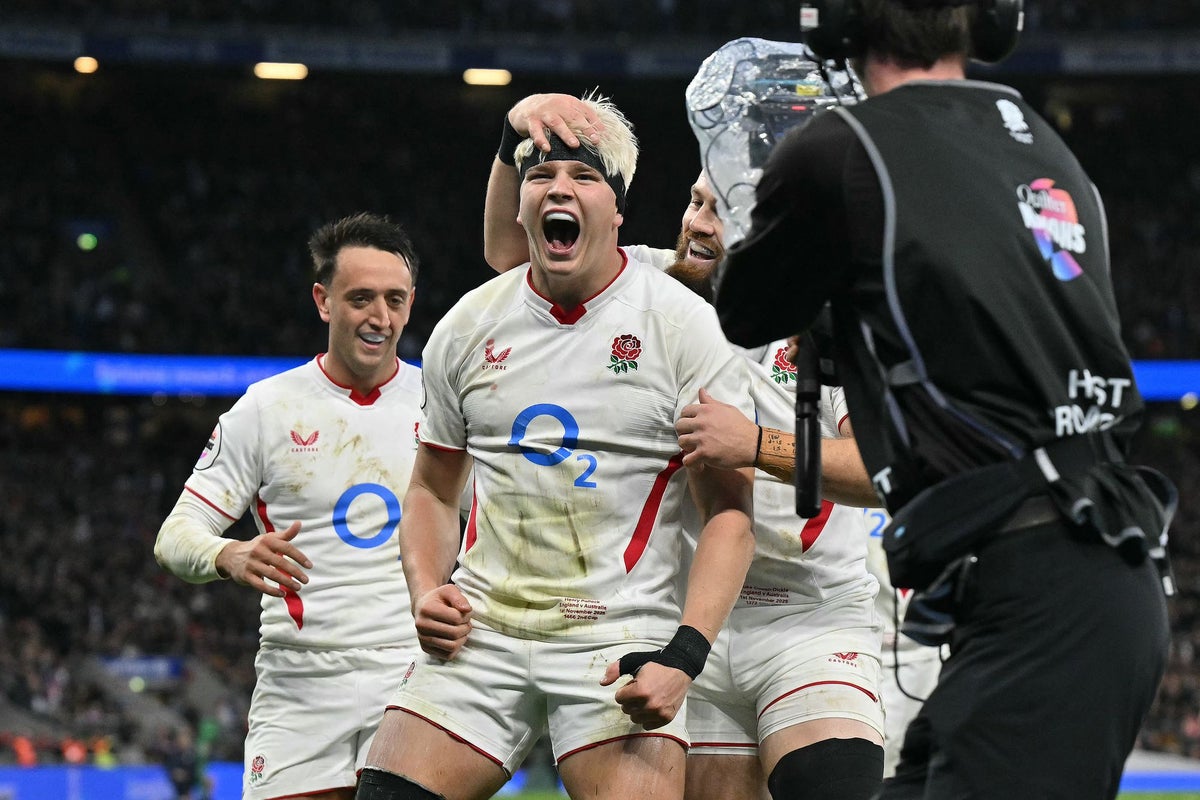England may not quite not yet look like the bonafide World Cup winners they have confidence they can be in two years time but this was nonetheless a positive first step on the long journey to Australia 2027. It took plenty of graft and grit to overcome the Wallabies but overcome they eventually were, with a ferocious defensive performance and second-half surge taking England to a solid start to their autumn.
In the process, a few ghosts of last November were perhaps banished. Australia’s victory here 12 months ago had been something of a heist, snatched at the last in an autumn of discontent in which England seemed to have forgotten how to win. This was a very different game yet there would have been some satisfaction in how, having shipped 42 points to their visitors a year ago, they kept the Wallabies to only a 95-metre intercept try here.
Clearly, the New Zealand clash in a fortnight shapes as the key contest in assessing this developing side’s top-tier Test credentials but one could see the pieces that Steve Borthwick is trying to put into place. England’s battalion of back rowers caused havoc at the breakdown on a day of the jackal in which they spoiling and stealing proved crucial, while a bunch of British and Irish Lions lurking among the replacements made their presence known in a final quarter as they tasted victory over the Wallabies once more. The bench impact was hefty, and crucial – as Borthwick perhaps intended.
It was a shame, of course, that Australia were missing a few key cogs, Joe Schmidt unable to select the Europe-based Will Skelton, Len Ikitau, Tom Hooper and James O’Connor with this game falling outside of World Rugby’s stipulated international window. Still, England would have learned from last year not to take even a weakened Wallabies lightly.
The hosts’ backline selection had looked one made with designs on controlling the air, Freddie Steward, Tommy Freeman and Tom Roebuck providing plenty of backline stature and spring for Alex Mitchell and George Ford to utilise. But Australia had come armed for aerial assault themselves – shotgun shells were fired up repeatedly with Joseph-Aukuso Suaalii sent off like a gun dog as a roaming retriever. It was a tactic that threatened to threatened to bring joy, with even Steward struggling to combat Suaalii’s unique threat.
By contrast to the kick-happy visitors, England began looking to play with pace, breaking from deep whenever Australia erred with their strategy and testing the edges with the ball. Hooker Jamie George, however, may reflect that he was too hasty in taking a quick tap penalty after a sustained spell on the Wallabies’ line; front row chum Joe Heyes was soon held up, releasing the pressure valve.
Ford got the scoring started from the tee after an Australian ruck infringement before England beat their opponents at their own game. With Suaalii settling beneath a Mitchell box kick inside the home half, there was little sign of clear and present danger, but a pursuing Roebuck beat the grounded centre to the ball as it tumbled down. Sam Underhill and Ben Earl were on hand to capitalise, Roebuck ferrying to the former before a quick transfer to the latter allowed the uber-athletic No 8 to stride under the posts.
England began to find their flow, challenging the Australian defence with big ball carriers at funky angles even in the face of some thumping hits from Taniela Tupou and co. – and a healthy half-time lead might have been theirs if Harry Potter hadn’t conjured two try-saving interventions. A rampaging Earl seemed certain to snare a second score from Ford’s short ball only to find Potter, somehow, beneath him as he went to ground, before the Wallabies wing shot out of the line to intercept a foolishly thrown pass from Fraser Dingwall five metres from the Australia line.
Away he raced from east Twickenham to west for a 14-point swing, leaving Australia just three in arrears. Potter had been a favourite of Borthwick’s during their time together at Leicester; not so now.
England felt they had plenty of reserve, six Lions on a bench packed with quality. Five of them, including half-centurion Luke Cowan-Dickie, arrived together on the 50-minute mark like trick-or-treaters, tasked with swinging a game increasingly in the balance their way. Australia’s confidence was building, if not their tally – Cowan-Dickie came up with a crucial jackal turnover metres from his own line soon after his introduction to keep the Wallabies out.
Also among the new quintet was Henry Pollock, making his Twickenham debut. Not that you’d have known it. Pollock practically pranced on like the proverbial peacock but soon, as is his habit, backed up that confidence. Roebuck was once more the aerial architect of his 20-year-old’s teammate try, tapping back an up-and-under, yet Pollock’s clean collection on the run down by his bootlaces showed some skill. A tap tackle prevented him properly strutting home, but a third try in 36 minutes of Test rugby was celebrated with trademark swagger.
The impact of those bench forwards began to tell; if not quite South Africa’s “Bomb Squad”, their impact was similarly sizeable. Two huge mauls were launched to provide two more tries: Mitchell first capitalised following a cynical slapdown from replacement Australia lock Lukhan Salakaia-Loto, before Cowan-Dickie finished off a 25-metre effort that eventually involved 12 of his teammates.
It was just 13 that remained at the last with Steward off injured and Pollock sent to the sin bin, but still they held firm in one last goalline stand. Captain Maro Itoje declared this week that there was no mountain that his side could not climb; this was an effective reaching of basecamp.

